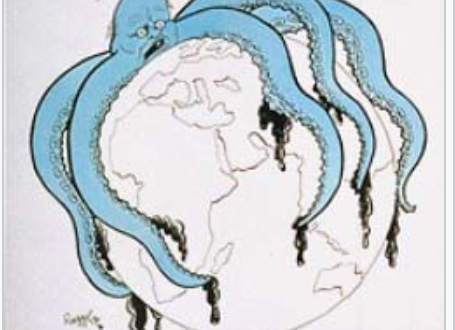This is a cross-post from All That Is Solid ...
It was with some interest I approached Martin Jacques’s piece in The Graun, not least because he made his name in the 1980s describing the contours of the ‘New Times‘ then being fashioned from the collapse of the post-war consensus and the broken bodies of the British and American labour movements. Much of what he and his comrades wrote in Marxism Today back in the day was spot on. The rise of flexible labour markets, inescapable consumer cultures, a displacement of class politics, deindustrialisation and the shift – at least in metropolitan countries like Britain – from the production of tangible commodities to service industries and knowledge/information production (of which more another time). They also advocated that the left in the shape of the jolly old Communist Party draw on the work of Antonio Gramsci and wage a cultural struggle as opposed to the trusty ‘n’ rusty industrial-focused strategy favoured by the left. In practice it meant embracing the “new” struggles around environmentalism, gender, anti-racism, and sexuality and placing less stress on class as traditionally conceived. Accused at the time of abandoning the field of class politics, Marxism Today was later held responsible for providing the intellectual heft ofBlairism and New Labour.
That’s by-the-by as far as this post is concerned. What Martin does in his article is catalogue the breakdown of neoliberalism but, despite the banner advertisement, he does not addresswhat comes or is likely to happen after neoliberalism. And who can blame him? Forecasting in politics is a notoriously fraught business, as pundits and pollsters have found to their cost this last couple of years. Yet thinking about what might come after neoliberalism isn’t click-attracting speculation and idle musing. Just as Martin and his comrades did in the 1980s, it’s about understanding what’s coming so it can be politically pre-empted.
Before we consider what’s coming next, it’s worth thinking about what neoliberalism is *now*. Traditionally, and understandably, it’s seen as a matter of economics. After all, in terms of economic policy the kinds of measures it favours are easily distinguishable from the post-war consensus that came before it. To apply broad brush strokes, in the advanced countries it meant active intervention by the state in economic affairs to, above all, maintain full employment. Markets were strictly regulated, capital controls enforced, workers representatives (via unions or some other consultative mechanism) integrated into the management of the system, and the state itself had a considerable economic footprint in the shape of nationalised industries. Again, broadly and ideal-typically, neoliberal policy is about withdrawing the state and leaving the market to its own devices. Based on the idea that the anarchy of market relationships nevertheless produce the most efficient economic outcomes, evacuating the state from the market via privatisations of state-owned industries, the deregulation of finance, and the curbing of union power creates, Bentham-stylee, the greatest good for the greatest number. The objective now is not the maintenance of full employment. Key indicators of economic health are quarterly GDP growth, low inflation, low public spending, and low tax rates. In Britain, Nicola Sturgeon and Ed Miliband were the first mainstream political leaders to suggest neoliberal policies fuelled inequality and social dysfunction, and hence had broken from the neoliberal consensus. Ditto Theresa May and her wholesale pinching of the 2015 Labour Manifesto’s economic policy.
That, however, is a very superficial understanding of what neoliberalism is. Yes, it’s fundamentally about the market, but it’s more than a macroeconomic policy preference: it is a mode of governance. Or, to put it plainly, a series of strategies deployed by institutions for managing populations and cultivating them as types of people, or subjects, conducive to capitalism in its neoliberal phase. What neoliberalism isn’t is a conspiracy thought through in advance by various elites and implemented against an unwitting populace. As Dardot and Laval note in their The New Way of the World: On Neoliberal Society, neoliberalism didn’t emerge as a coherent alternative to the crisis of the post-war Keynesian order. It came into the world bit by bit, as (apparently) pragmatic policy responses to pressing economic and political problems. Denis Healey didn’t submit Britain to structural adjustment in return for an IMF loan because he was philosophically committed to the Mont Pelerin Society. At the time, it seemed like the loan could get the economy out of the toilet. Thatcher’s government went after the trade unions because they represented a challenge and threatened the interests of British business, not because Hayek and Friedman were opposed to the “distortions” collectivised labour exercised over labour markets. In the process of struggle, governments introduced policies we now consider neoliberal and, especially in the case of Reaganomics and Thatcher, increasingly identified their economic and governance strategies with the intellectual spadework of the Chicago School and other cabals of neoliberal thinkers. As Thatcher herself admitted in The Downing Street Years, she didn’t enter Number 10 with an intellectually rounded-out programme. It took on coherence largely after the fact. Before that point, what came to be neoliberalism was, in Dardot and Laval’s words, effectively a set of strategies without a strategist.
To properly get to grips with neoliberalism, we should think about it on three levels. The first is economic policy, which we’ve already talked about. The other two, that interest us here, is the intertwining of government and subjectivity. Condensing Dardot and Laval’s arguments, the incremental adoption of neoliberal strategies have resulted in what they call the ‘entrepreneurial state’. Take Britain for example. As society has become more complex, so has the state. The classical Marxist conception of the state as a repressive body that defends and prosecutes capital’s interests is right on a basic level, but doesn’t capture the complexity of the body as it exists today. Rather than a unitary institution with an executive, a bureaucracy, and its repressive arms the state has developed into a more dispersed and diffuse gaggle of semi-autonomous institutions. In the British example, from Thatcher onwards the physicality of the state is distributed among a number of bureaucracies with areas of competence, each under a particular minister and therefore responsible to the government of the day. Think the DWP and its previous iterations, the MOD, the Education Dept, and so on. Each are operationally autonomous from one another but are united under a relationship of command to the executive. As well as this, we have the devolved administrations and local government, and any number of Quangos with areas of competence and specialism. On top of this there are subdivisions in each of these institutions, and various non-governmental organisations like charities, community groups, and so on can be incorporated into the mix. What they all have in common is the sharing of governance functions. Or, rather, they specialise in a particular kind of population management.
Do read the rest of Phil’s post here


